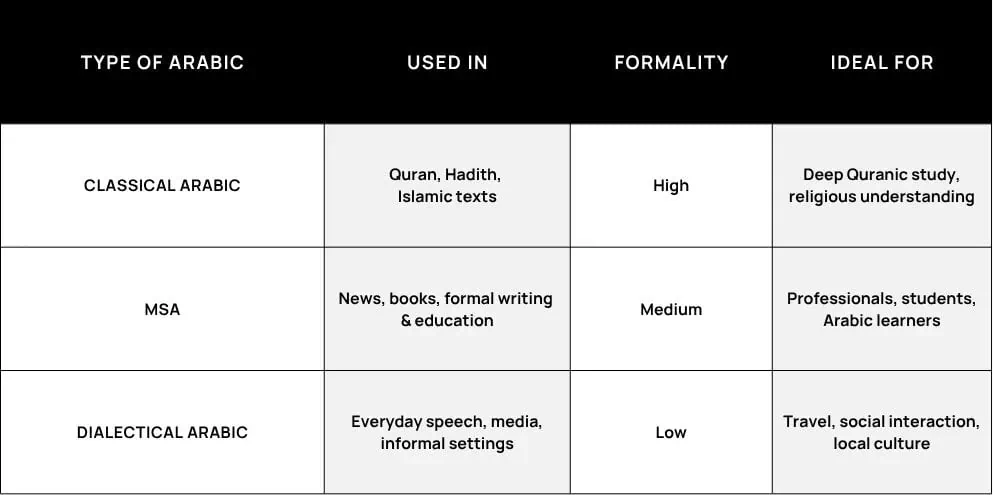There are different forms of Arabic — Classical Arabic, Modern Standard Arabic (MSA), and Dialectical Arabic.
If your goal is to truly understand Arabic — not just speak casually — the strongest path is through the Quran first.
This guide breaks down the differences and shows why starting with Classical Arabic sets you up for real mastery.
1. Classical Arabic (Including Quranic Arabic)
This is the most traditional and preserved form of Arabic.
It includes the language of the Quran, Hadith, and classical Islamic scholarship.
And follows precise grammar rules and has remained unchanged for centuries.
- Where is it used?
Religious texts, Quran, Hadith, classical Islamic literature, and formal religious education - Who should learn it?
Anyone seeking tounderstand the Quran or pursue Islamic sciences
Key takeaway: Timeless, complex, and spiritually foundational
2. Modern Standard Arabic (MSA)
MSA is a modern, simplified version of Classical Arabic.
It keeps the formal structure but is more accessible and widely used in contemporary contexts.
- Where is it used?
News, books, media, schools, official communication - Who should learn it?
Professionals, students, or anyone wanting to read or work across the Arab world
Key takeaway: Formal, widely understood, but not spoken casually
3. Dialectical Arabic
Each Arab country — and often each region — has its own spoken dialect.
These are informal, fast-evolving, and can differ greatly from one another and from MSA.
- Where is it used?
Daily conversations, TV shows, songs, social media - Who should learn it?Travelers, expats, or those wanting to connect socially with native speakers
Key takeaway: Practical for daily life, but not standardized or used in writing
Quick Comparison

Our Recommendation: Start with Quranic Arabic
If your goal is to truly understand Arabic — not just memorize phrases or mimic speakers — then the best place to start is through the Quran.
- The Quran is the highest and purest form of Arabic — used for centuries as the reference point for the language’s grammar.
- It offers a precise and spiritually grounded foundation from which you can later explore MSA or dialects with much more ease and depth.
- Learning Classical Arabic trains you to think in Arabic, not just recite words.
At Arabic Accelerator⚡, we’ve built a complete learning system that guides you step-by-step through the structure of the Arabic language. Using Quranic examples and a scientific, spiritually enriching approach.
It’s not just about reading the Quran.
It’s about unlocking how Arabic works — at its very source.
